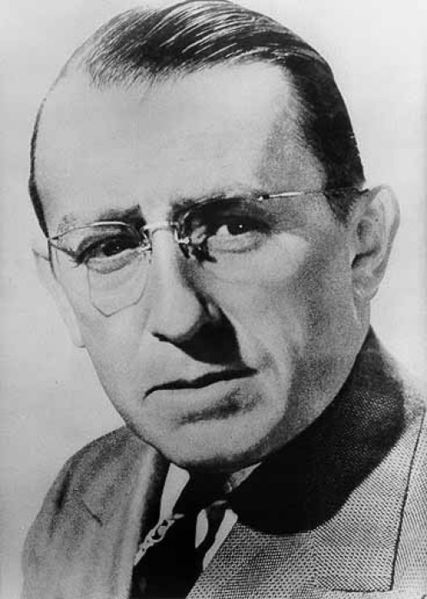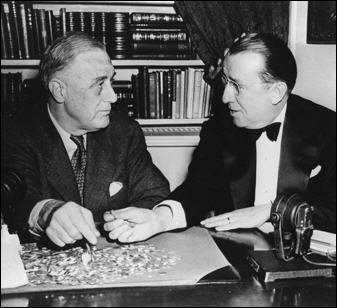<Back to Index>
- Lawyer and Businessman Basil O'Connor, 1892
PAGE SPONSOR


Basil O'Connor (January 8, 1892 Taunton, Massachusetts – March 9, 1972 Phoenix, Arizona) was an American lawyer. In co-operation with U.S. President Franklin D. Roosevelt he started two foundations for the rehabilitation of polio patients and the research on polio prevention and treatment. From 1944 to 1949 he was Chairman and President of the American Red Cross and from 1945 to 1950 he was Chairman of the League of Red Cross Societies.
Basil O'Connor did his undergraduate work at Dartmouth College and graduated from Harvard Law School, then was admitted to the bar to practice law in 1915. For one year he worked in New York for the law firm Cravath & Henderson and for the next three years for Streeter & Holmes in Boston. In 1919 he founded his own law firm in New York, where he met Franklin D. Roosevelt in the early 1920s and became his legal advisor. In 1924 the two men associated in their own law firm which existed until Roosevelt's first inauguration in 1933. Beginning in 1934 O'Connor was Senior Partner in the law firm O'Connor & Farber. Moreover he was executive manager of a number of companies, among them the New England Fuel Oil Corporation in the 1920s, the American Reserve Insurance Corporation and the West Indies Sugar Corporation in the 1940s.
In 1921 Franklin D. Roosevelt had developed flaccid paralysis of the upper and lower extremities, which was diagnosed as poliomyelitis. In the light of newer research, however, Roosevelt's disease may have been Guillain - Barré Syndrome (GBS), which was scarcely known at the time. In 1927 Roosevelt founded the Georgia Warm Springs Foundation, with O'Connor as his partner. After Roosevelt's death the foundation was renamed to Roosevelt Warm Springs Institute for Rehabilitation and gradually began taking care of patients with handicaps of all kinds. The foundation raised funds to support polio patients and Roosevelt himself was president of the foundation until his 1928 election as Governor of New York. Roosevelt's successor as foundation president was O'Connor, who had been the foundations treasurer at the outset. Ten years later, in 1938, the two men joined to initiate the National Foundation for Infantile Paralysis, which focused on supporting research on polio prevention and treatment. The foundation became notable because of its revolutionary fund raising radio campaign, called the March of Dimes, with its appeal to Americans to "Send your dime to President Roosevelt at the White House" for the fight against polio. The first campaign was a smashing success and revolutionized fundraising in America, with over $1,800,000 raised. Now, instead of appealing to a few large donors, as had been the practice with fundraising in the past, the new method was an appeal to the millions for small or very small donations. Since 1979 the foundation's name has been March of Dimes. On April 12, 1955 – ten years after Roosevelt's death – the National Foundation published the successful results of Jonas Salks research on the development of a polio vaccine.
On Roosevelt's advice O'Connor was Chairman of the American Red Cross from 1944 to 1947 and its President from 1947 to 1949. In this capacity he was also Chairman of the League of Red Cross Societies from 1945 to 1950.
After his activities for the Red Cross O'Connor devoted much of his time to the work in the two foundations which he presided over until his death. His efforts in fundraising were much more successful than those of other foundations. For example, the National Foundation for Infantile Paralysis succeeded in collecting $66.9 million in 1954 for 100,000 new patients, while in the case of about 10 million patients with heart diseases only $11.3 million were donated. In 1958 O'Connor received the Mary Woodard Lasker Award for Public Service of the Lasker Foundation in recognition of his efforts in the fight against polio. On January 2, 1958 the National Foundation celebrated its 20th anniversary at Warm Springs, Georgia, and Basil O'Connor was honored by having his bust inducted into the Polio Hall of Fame next to FDR and fifteen polio scientists from two centuries.
The following undated quotation is attributed to Basil O'Connor:
- “The world cannot continue to wage war like physical giants and to seek peace like intellectual pygmies.“